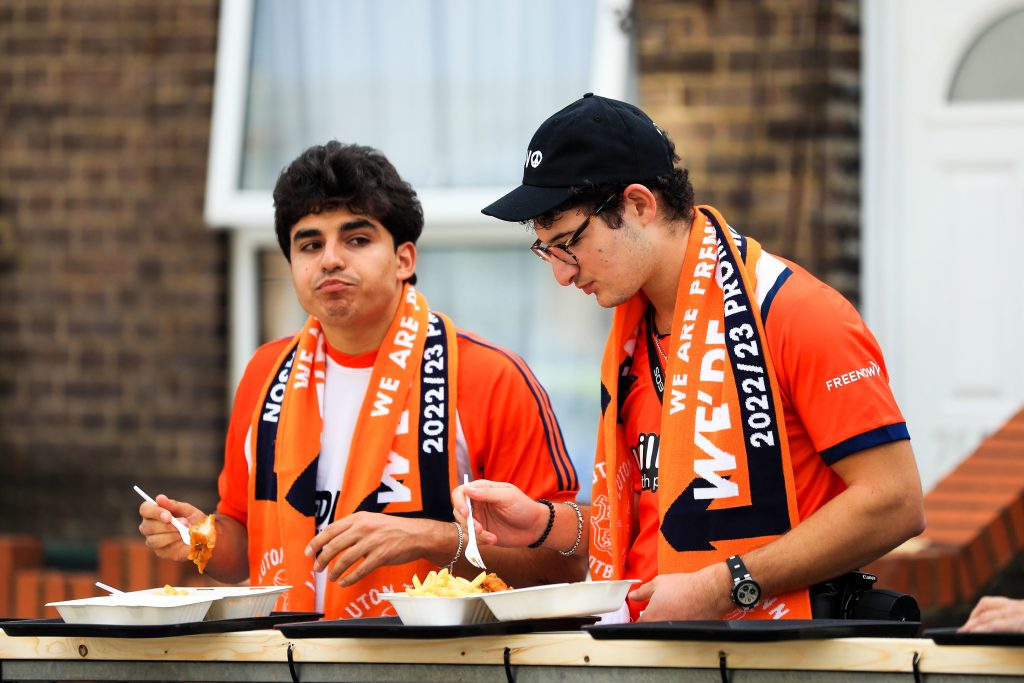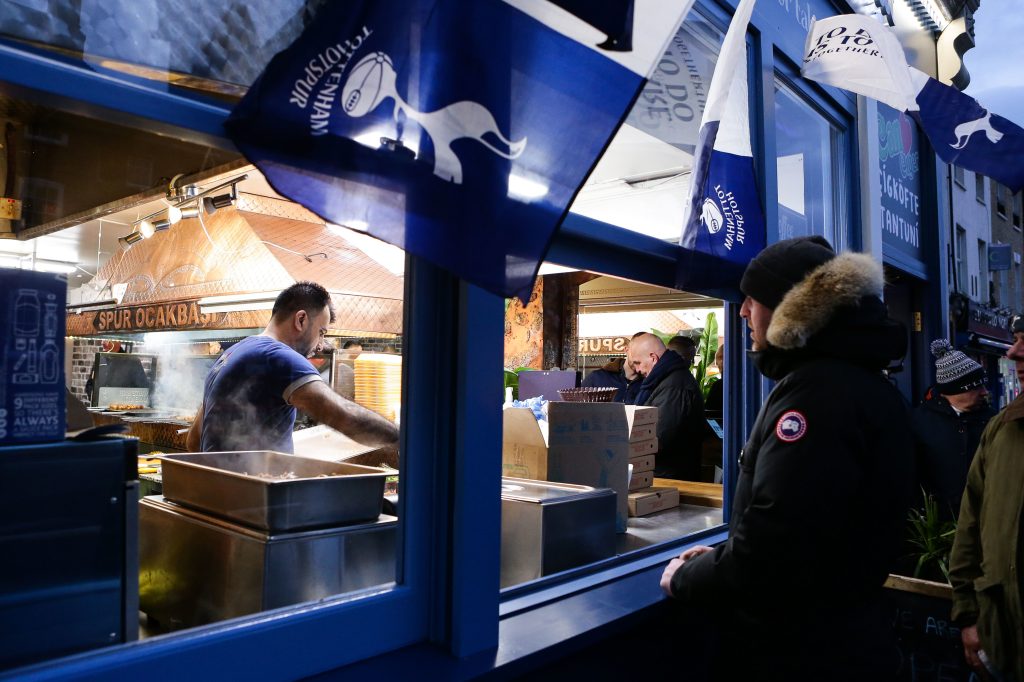When it comes to matchday in England, the experience extends far beyond the 90 minutes on the pitch. Stadiums across the country have stepped up their game, transforming food from a quick bite into a highlight of the day. From award-winning pies on League Two grounds to gourmet twists at Premier League arenas, Footy Scran updates in England have become part of discussions around the beautiful game.
What makes it even more exciting is the diversity on offer: classic steak and alae pies, loaded with fries dripping with toppings, indulgent burgers, and even vegan creations that rival their meaty counterparts. Clubs are embracing local flavours and unique traditions, proving that stadium dining can be just as thrilling as the action on the field.
This post dives into some of the best football stadium food in England, celebrating the dishes that have earned cult followings and elevated the matchday experience.
Football stadium food: The culinary revolution thanks to Footy Scran
The culinary journey isn't limited to the elite clubs. From Tooting & Mitcham FC’s jerk chicken box to doner meat and chips at Cranfield United, lower-league teams are making strides on the food front.
Boneless Jerk Chicken, Rice & Plantain at Tooting & Mitcham FC – £13
Boneless Jerk Chicken, Rice & Plantain at Tooting & Mitcham FC (@OfficialTmufc @TheShakltd)
? £13 pic.twitter.com/LEzn2dz387
— Footy Scran (@FootyScran) October 22, 2023
Fans now want to be fed well, and the football food renaissance has found its chronicler in @FootyScran. The X account stands as a vigilant watchdog, documenting the best and worst scran across England's stadiums. The platform sparks debates among fans and serves as a platform for supporters to express their culinary grievances.
Large doner meat and chips at Cranfield United – £7.50
Large doner meat and chips at Cranfield United (@CranfieldUnited @Kizzyetrance)
? £7.50 pic.twitter.com/cWkgRODVvP
— Footy Scran (@FootyScran) October 3, 2023
This new age of delicious football scran has even gone to the other side of the world with Croydon City Soccer Club, a football team based near Melbourne, Australia, serving up this delicious burger for just under £10.
Double beef and bacon burger at Croydon City – $18 AUD (£9.30)
Double beef and bacon burger at Croydon City SC (@Croydon_CitySC, Melbourne)
? $18 AUD (£9.30) pic.twitter.com/frITDuNpxO
— Footy Scran (@FootyScran) April 16, 2024
The shift in football stadium food isn't merely a change in menu; it's a cultural and economic transformation. Clubs are recognising that the matchday experience extends beyond the match on show, and culinary offerings play a pivotal role in engaging fans. The economic impact is evident, with clubs introducing a variety of dishes to cater to the diverse tastes of their supporters.
Chinese chicken skewer on a flatbread at Barnsley – £6.95
Chinese chicken skewers on a flatbread at Barnsley FC (@BarnsleyFC)
💷 £6.95 pic.twitter.com/b245DnGv3z
— Footy Scran (@FootyScran) January 10, 2026
The idea of Chinese chicken skewers on flatbread at Barnsley would have been laughed out of the room 20 years ago, but it is very much the norm these days. In fact, all of the food options at Oakwell go above and beyond what you'd expect to find at a football stadium.
Best examples of top footy scran and football stadium food
A festive offering at Pride Park
@FootyScran Christmas menu this weekend at Pride Park. @dcfcofficial Pigs in Blankets, stuffing, chips & gravy! #dcfcfans #footyscran pic.twitter.com/TE4XxUy078
— lucynorthstandram (@luc7_dcfc) December 21, 2025
A salt and pepper sharing platter at the Hill Dickinson Stadium – £20
Salt and pepper sharing platter at Everton (@Everton)
💷 £20 pic.twitter.com/3CbIxPg2kW
— Footy Scran (@FootyScran) December 7, 2025
Butter chicken tikka and rice at Preston North End – £6
Butter chicken tikka and rice at Preston North End (@pnefc)
? £6 pic.twitter.com/0uhZQRZnpf
— Footy Scran (@FootyScran) October 23, 2023
BBQ Chicken loaded fries at Luton Town – £10
BBQ Chicken loaded fries at Luton Town (@LutonTown)
? £10 https://t.co/u2LeQOLee9 pic.twitter.com/0PyP1hZJzs
— Footy Scran (@FootyScran) October 7, 2023
Getting looked after at Luton today
Here’s the Kenny Henny special pic.twitter.com/CdwumHuvOW
— Peter Crouch (@petercrouch) October 7, 2023
Steak pie, creamy mash, peas, gravy and mint sauce at Harrogate Town – £11
Steak pie, creamy mash, peas, gravy and mint sauce at Harrogate Town (@HarrogateTown)
? £11 pic.twitter.com/2boeCfSB1y
— Footy Scran (@FootyScran) September 24, 2023
The chippy tea butty – fishcake on a bed of chips, topped with mushy peas and tartar sauce at Doncaster Rovers FC – £8
The chippy tea butty – fishcake on a bed of chips, topped with mushy peas and tartar sauce at Doncaster Rovers FC (@drfc_official)
? £8 pic.twitter.com/F2aUFBuV3L
— Footy Scran (@FootyScran) January 25, 2024
The gaffer burger – chicken, beef, bacon and cheese at Tilbury FC (@tilburyfc)
💷 £9.50 pic.twitter.com/nt0YZvWbtO
— Footy Scran (@FootyScran) October 29, 2025
Burgers gone bad – the worst footy scran and football food
While the culinary landscape has undeniably improved, not every football club has jumped on the gastronomic bandwagon, and some clubs are even missing the mark on burgers!
This series of tweets from @FootyScran reveals a string of disappointments, highlighting the questionable state of burger affairs at certain grounds.
Take, for instance, the cheeseburger at Hartlepool United, priced at £3.90. This burger showcases a lacklustre creation that leaves much to be desired.
Cheeseburger at Hartlepool United (@Official_HUFC)
? £3.90 pic.twitter.com/0p9cgShRoh
— Footy Scran (@FootyScran) October 14, 2023
Oxford United doesn't escape the scrutiny either. Their cheeseburger, priced at £4.40, is another culprit in the lineup of subpar stadium burgers. Dry patty, awkwardly dry and half-melted cheese, and a hesitantly central dollop of sauce.
Cheeseburger at Oxford United (@OUFCOfficial)
? £4.40 pic.twitter.com/M0DsliQmtd
— Footy Scran (@FootyScran) January 10, 2023
Leeds stumbles in the burger department with a £5 chicken burger that, despite its premium price tag, leans more towards the basics. Stripped down to less than the essentials, one can't help but hope there's some sauce waiting to rescue this basic burger.
Chicken burger at Leeds United (@LUFC)
? £5 pic.twitter.com/5hih5M3wnP
— Footy Scran (@FootyScran) October 7, 2023
Walsall adds its name to the list with a dry cheeseburger priced at £5.30. This poor patty looks like it has spent too much time under the stadium floodlights. And let's talk about the cheese—or should we say, the cheese's failed attempt at a dramatic entrance. Melted cheese is the unsung hero of a great cheeseburger, and here it is, having an identity crisis.
Cheeseburger at Walsall FC (@WFCOfficial)
? £5.30 pic.twitter.com/WAEM8678SU
— Footy Scran (@FootyScran) September 24, 2023
Sustainability and veganism: A greener goal for football stadium food
As the culinary revolution takes centre stage, so does the call for sustainability and veganism in football stadium food. The global movement towards environmentally conscious practices has found its way to the pitch, with clubs making strides in reducing their carbon footprint and adopting sustainable practices.
While many clubs are making strides in sustainability, Forest Green Rovers stands as a pioneer in veganism. Declared the world’s first vegan football club by FIFA and certified as the world’s first carbon-neutral football club by the United Nations, Forest Green Rovers have made sustainability and veganism integral to their identity.
Their menu, featuring plant-based pies, sausage rolls, burgers, and more, not only caters to vegan fans but also challenges the perception of vegan food. The club's commitment to sustainability goes beyond the culinary offerings; they have become a global example of how a football club can lead the way in environmental responsibility.
Vegan football food at Forest Green Rovers
Today’s second half snack…
Keralan cauliflower, chickpea & onion bhaji pasty at Forest Green Rovers Football Club
Rating in our video review 👀@FGRFC_Official | #paidpartnership pic.twitter.com/LLp0iDFMy7
— The Padded Seat (@PaddedSeat) February 24, 2024
Forest Green Rovers' journey is a testament to the impact a football club can have on shaping perceptions and inspiring change. From burgers to pies, they've shown that sustainable and vegan options can be not just environmentally conscious but also delicious.
Meat-free options have become a staple in many stadiums, aligning with a broader effort to reduce the environmental impact of meat consumption. Clubs are not only offering vegan alternatives but are actively working with meat-free providers to ensure the quality and taste of these options.
Liverpool FC's partnership with Quorn is a notable example, not just for providing tasty alternatives but also for the significant reduction in carbon emissions at Anfield. The environmental impact of food choices is becoming a key consideration for clubs, and initiatives like the Sports Positive Leagues matrix are evaluating clubs' sustainability efforts, including their commitment to “Plant-Based, Low Carbon Food.”
Footy scran from around the world
As much as we Brits love our traditional matchday offerings such as pies and burgers, there is a whole variety of food on offer at stadiums around the world.
Some are not too dissimilar from the United Kingdom's fan-favourites, others push the boat out a little further. Here's a collection of some of the best dishes seen abroad:
Currywurst with fries at 1. FC Kaiserslautern (@Rote_Teufel)
💶 €8.50 (£7.20) pic.twitter.com/l5obPjwUNa
— Footy Scran (@FootyScran) May 4, 2025
Beer and Meat Buns at Vissel Kobe. ¥1400 @FootyScran pic.twitter.com/UVIrG8SYmW
— Lloyd Bowman (@lbowman6) May 3, 2025
Buffalo chicken with waffle fries at Wellington Phoenix women (@WgtnPhoenixFC @aleaguewomen)
🇳🇿 $14 NZD (£6.20) pic.twitter.com/WBtouu4FEQ
— Footy Scran (@FootyScran) April 20, 2025
Lithuanian footy scran! Cc: @FootyScran
FK Kauno Žalgiris in the city of Kaunas 🇱🇹 for Kauno Žalgiris vs SuduvaGreat stadium, too ⬇️ pic.twitter.com/3wsvvhcA80
— Christopher Hylland (@hyllnd) April 12, 2025
Kebab plate served with fries and a beer at GIF Sundsvall (@GIFSundsvall)
🇸🇪 135 sek (£10.50) beer included pic.twitter.com/apy5Uems16
— Footy Scran (@FootyScran) November 9, 2025
From the pitch to the plate, the beautiful game transforms


FGG says: An ever-changing landscape
The culinary transformation in English football stadiums is more than just a change in menu; it's a cultural and gastronomic revolution. The days of limited choice are long gone (in many grounds), replaced by a diverse menu reflecting global influences on and off the pitch.
From the best to the worst, the culinary landscape at football stadiums tells a story of evolution and diversity. Clubs are not just serving food; they create an experience that engages fans beyond the ninety minutes of play.
The economic impact is evident, with fans now expecting a range of culinary options to suit their tastes. The shift towards sustainability and veganism reflects a broader societal change, and football stadiums are not immune to this wave of environmental consciousness.
As clubs carve out their unique culinary identities and embrace the diversity of global flavours, the beautiful game extends beyond the pitch to the plate. The next time you find yourself at a match, relish not just the goals and the atmosphere but the scran as well.
